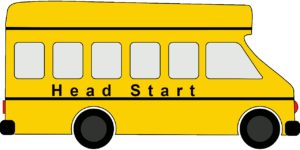If you qualify, then you should absolutely send your child to Head Start. Head Start is full of excellent teachers and your child will be in a safe, loving, and caring environment. You may qualify even if you make too much money. Read below to find out more.
Head Start is a preschool program for low income families and families with other difficulties. The government subsidizes Head Start tuition. Like many other preschools, Head Start’s mission is to prepare children from low income families for school.The government subsidizes Head Start tuition.
Qualify for Head Start
 Low income families are the primary target of the Head Start program. If your earnings are below your area’s poverty line, then you qualify, but you must still apply due to Head Start limited enrollment. If you’re not sure about qualifying, then the best thing to do is find and call your local Head Start.
Low income families are the primary target of the Head Start program. If your earnings are below your area’s poverty line, then you qualify, but you must still apply due to Head Start limited enrollment. If you’re not sure about qualifying, then the best thing to do is find and call your local Head Start.
Children in foster care, homeless children, and children from families receiving public assistance (Temporary Assistance for Needy Families or Supplemental Security Income) are categorically eligible for Head Start and Early Head Start services regardless of income.
My Income is Too High for Head Start
You may still be in luck. Each program may enroll up to 10% of its students that come from higher income families or families in emergency situations.
The Cost of Head Start
Head Start is free for everyone who attends.
Head Start Transportation
 Each Head Start location decides whether they provide transportation for their students. If you need transportation, make sure to ask each school about their transportation services so that you know your options and can pick a Head Start that fills your needs.
Each Head Start location decides whether they provide transportation for their students. If you need transportation, make sure to ask each school about their transportation services so that you know your options and can pick a Head Start that fills your needs.
Accomodating Children With Special Restrictions and Needs
All Head Start programs must accommodate students with disabilities or dietary restrictions. The entry process will be different for these children, as you will need to notify your Head Start about your child’s unique needs. If your Head Start is not accommodating your child’s needs, report your issues to the program’s directory and they will help you out.
Children With Special Needs
Children with special needs will require a doctor’s note and/or recommendation to provide the necessary accommodation. Usually, these children have an Individualized Family Service Plan (IFSP) and/or Individualized Education Plan (IEP). IFSPs are for ages 0-2, where IEPs are for ages 3-21. Here is a great chart that outlines the differences between an IFSP and IEP.
Children With Dietary Restrictions
Head Start will accommodate children with dietary restrictions by substituting out items they cannot have. For example, a child who cannot have dairy products with receive soy, almost, or other types of milk instead of cow’s milk. Beware though, sometimes the substitute products will not be as good as the original. Read more about dietary restrictions in preschool.
The Pros and Cons of Sending Your Child to Head Start
Now that you know that your child can attend Head Start, is it the right choice? Is it worth it? Is there a different kind of price to be paid for a free program? Here are the pros and cons of sending your child to Head Start:
Pros of Attending Head Start
Your child will be ready for kindergarten
You are a busy parent and you don’t have the time and energy to prepare your child for the next step of their life. Head Start will help close that gap for you.
Your child will reach their developmental milestones quicker
Head Start teachers are trained and licensed in teaching these milestones, which are: Cognitive Development, Social Emotional Development, Speech and Language Development, Fine Motor Skills, Gross Motor Skills.
Your child will learn about different cultures
This helps give them a better view of what the world is like. Children often grow up isolated in one culture and are unaware of the diversity of the world around them. The earlier your child learns about diversity, the easier it will be for your child to adapt to new environments later in life.
Your child will learn daily life skills and routines
For example, the whole class will have family meals together, and teachers encourage students to converse with each other while they eat. They will understand that there is a class routine and that they should follow the schedule at all times. For example, outdoor time starts after center time, but everyone must clean up first.
Your child will learn social norms that exist outside your home
All children will eventually learn that hitting, spitting, running in the wrong places, and a lot of other behaviors are not acceptable. This will help your child become more agreeable to build friendships more quickly.
Your child will begin to build friendships and understand their meanings
This will allow your child to know what is appropriate and not appropriate if they want to play with another child and maintain the friendship.
Your child will become more independent and creative
Head Starts encourage children to be creative and express themselves on paper, verbally, and through play. This allows children to be individuals and use their thinking skills.
Your child will have the opportunity to compare themselves to their peers
This influences and motivates your child to reach for greater achievements.
Your child will understand that there are limits and boundaries at school
The things your child does at home will not always be acceptable at school. Your child will adapt to what is acceptable/unacceptable in the school setting.
Children will receive extra support when they need it
For example, children who are delayed in speech will be assessed and referred for a specialist as required. Any number of things can happen at that point, depending on the discussions and meetings you have with the teacher and/or specialist.
Cons of Attending Head Start
Children spend less time with their parents
Parents will need to adapt to the new influences in their child’s life, which they may or may not like.
Head Start does not celebrate holidays
They are not allowed to celebrate Christmas, Thanksgiving, Easter, etc, in order to respect all of the different cultures that attend Head Start.
Parents may not agree with Teachers’ decisions
Sometimes decisions are made in the best interest of an entire class, but a parent believes is not in the best interest of their child. This can create conflict and arguments. Teachers will take time to meet with parents to discuss and resolve these matters.
Your child will have the opportunity to compare themselves to their peers
This was also a Pro, but it can have negative consequences. Your child may decide to take on a negative behavior to gain attention, such as randomly screaming.
Teachers come to your house
Teachers will do two home visits and two parent conferences per year to assess your child’s capabilities in the home setting.
Your child will come home dirty
Head Start teachers encourage children to explore everything that’s offered, such as paint, playdough, slime, sandboxes, etc. Be prepared to put an extra pair of clothing at your child’s school.
Children must be potty trained before starting at Head Start
There is some leniency if potty training is still in progress, but the more trained the better for everyone.
Children have accidents
If your child has a potty accident in their pants, the teachers will clean and change them into their extra pair clothes. However, if your child potties multiple times, they may be sent home and a toileting plan will be put in place before they can return to school.
Children will get injured on occasion
Injuries can happen for a few reasons. Kids will hit and push each other, say negative things to each other, or accidentally hurt themselves with objects or by falling. This is a typical ongoing occurrence but can be stressful to all of the adults involved, especially parents.
Don’t Be Deterred. Head Start is a Great Option!
Children are in a safe environment at Head Start with qualified staff. Most of the cons happen in everyday life, whether they are at home or at the park. Allowing these cons to take place in a safe environment allows you to go to work or school and accomplish your own personal goals. You can, and should, take advantage of the free programs that are offered to you.
What are you waiting for? Go register your child!

